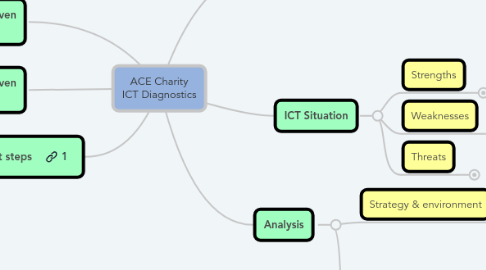
1. Opportunities for ICT-driven improvement
1.1. Joined-up and managed approaches to information management, ICT etc.
1.2. Generally enable a "virtual ACE" - in the Cloud and in "real-time"
1.3. More co-ordinated/managed use of volunteers/trustees
1.4. Improved communications and engagement targeted at different profiles with clear objectives and key messages (inc. digital)
1.5. Enhance financial management and funding channels
2. Opportunities for ICT-driven innovation
2.1. Enablers
2.1.1. NHS digital strategy
2.1.2. Funding pots for digital
2.1.3. COVID-19 will increase funding pots
2.1.4. Technology becoming more accessible
2.1.4.1. Low-cost
2.1.4.2. Easier to use
2.1.4.3. Lots of Apps to support disabled/elderly/communities
2.1.5. AC in good position to "professionalise" health/wellbeing data / metrics /management
2.2. Ideas
2.2.1. Joined-up/managed social prescribing
2.2.2. Opportunities for inter-generational projects
2.2.3. Virtual AC
2.2.4. Supporting digital users
2.2.5. Digital-enhanced social/sports activities
2.2.6. Digital enhanced cultural projects
2.2.7. Engagement of a broader range of users in driving change
3. Next steps
3.1. Set-up a group focused on ICT-driven improvement (trustees, staff, volunteers)
3.1.1. Raise awareness / explore options
3.1.2. Create strategy and plan (informed by and aligned to business plan)
3.1.2.1. Information, data, document, ICT management
3.1.2.2. Communications and engagement
3.1.2.3. Financial and funding management
3.1.3. Implement plan
3.1.3.1. Seek trustee approval and budget
3.1.3.2. Divvy up tasks
3.1.3.3. Agile / reflective / review approach
3.2. Set-up a group focused on ICT-driven innovations (trustees, staff, volunteers + others)
3.2.1. Raise awareness / brainstorm ideas
3.2.2. Create outline vision and plan for ICT-driven innovation (informed by and aligned to business plan)
3.2.3. Identify and develop a pilot project
3.2.3.1. Seek trustee approval and budget
3.2.3.2. Divvy up tasks
3.2.3.3. Agile / reflective / review approach
4. Approach
4.1. Process used based on Onlinconshire (agile, reflective)
4.2. Supporting the charity in making informed decisions and in implementation
4.3. Raising awareness of what’s possible (using established and “new” technologies)
4.4. Business/strategy-driven / common-sense-driven.
4.5. Two broad areas of focus:
4.5.1. Supporting operations e.g. information management, communications & engagement (internal/external), accounting
4.5.2. Innovation in new products & services
4.6. Taking into account charity resources, skills, mindset/culture, time
4.7. So far - have conducted interviews and have preliminary ideas
5. ICT Situation
5.1. Strengths
5.1.1. Lots of motivation / aspiration
5.1.2. Basic infrastructure in place
5.1.3. Innovation already established e.g. Tablets
5.1.4. Many skills to be drawn on, but potential for improvement
5.1.5. Support from trustees and volunteers but this needs strengthening
5.2. Weaknesses
5.2.1. Piecemeal development
5.2.2. No clear strategy, plan, budget
5.2.3. Lack of joined-up approaches
5.3. Threats
5.3.1. Data integrity
5.3.2. Security
5.3.3. Theft/fire etc.
6. Analysis
6.1. Strategy & environment
6.1.1. Challenges
6.1.1.1. Varying needs/interests of users
6.1.1.2. Perceptions of the Centre
6.1.1.3. Funding disruptions
6.1.1.4. Need for changing mindsets towards health & wellbeing - for a broader age range
6.1.1.5. Motivating/retaining staff/volunteers
6.1.1.6. Overlaps of services with other agencies
6.1.2. Aims
6.1.2.1. Support NHS's health, wellbeing and digital aspirations
6.1.2.2. Focus on health, wellbeing and community for a broader age range (including youth)
6.1.2.3. Develop new services
6.1.2.4. Increase and stabilise funding
6.1.2.5. Maintain a highly engaging and valued environment for users, staff, volunteers and trustees
6.1.2.6. Research impact and evidence success
6.1.2.7. Sustainability
6.1.3. Constraints
6.1.3.1. Premises
6.1.3.2. Time & resources
6.1.3.3. Degree of trustee involvement????
6.1.3.4. Collaborations / partnerships /new developments take time
6.1.4. How impact is researcher/measured and success evidenced
6.1.4.1. Currently, inadequate
6.2. Operations and processes
6.2.1. Key issues
6.2.1.1. Fragmented approaches to managing data/information/documents etc.
6.2.1.2. Lack of documented policies/procedures wrt managing information, data etc.
6.2.1.3. Lack of clear strategy and plan for communications and engagement (inc. digital)
6.2.1.4. Accounting
6.2.1.5. Insufficient training needs analysis / CPD
6.2.1.6. Staff time
6.2.2. Risks - what-if scenarios
6.2.2.1. Staff/volunteers leave
6.2.2.2. Fire / theft
6.2.2.3. Digital attack
6.2.2.4. COVID-19 and similar/more of.....
6.2.2.5. Funding collapse
6.2.2.6. +......
